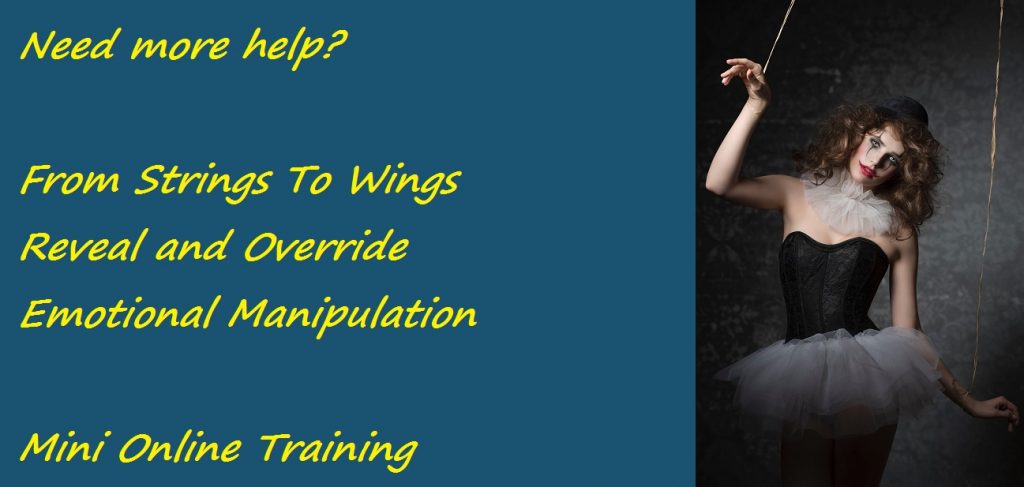
With open, straight communication and with insight to what’s going on the surface and in the hidden level.
The 3 important points I can summarize in regards to the complex task are:
A: We must not use manipulative techniques to control our children’s behavior! We need to take responsibility for our words, actions, and requests!
B: Raise awareness when manipulation happens.
C: Help them with sorting out and getting rid of the imposed feeling of guilt, shame and anxiety.
In order to be able to perform these tasks, we need to be as clear as possible as to what constitutes manipulation.
The manipulator wants to control the target’s behavior by imposing guilt, shame or anxiety. S/he is doing it by referring some arbitrary rules on how good friends, children, and spouses behave. If the target does not behave that way, s/he faces the prospect of being labeled as a bad friend, bad child and has to be ashamed or worried about abandonment or rejection.
A/ Do we unconsciously manipulate them?
Most of us are sensitive to manipulation because this was the way we were socialized: “Good children listen to their parents.” In some cases the consequence is emotional withdrawal showing in facial expression, atmosphere, or silent treatment: “I don’t love you if you’re bad.” Big – big –big threat for the kids! ( Notice! What is good or bad is arbitrary and the rules change from situation to situation! It differs from family to family.)
Another situation: the children are tired, they are getting ready very slowly in the morning, and you are getting late. One seemingly innocent competition might resolve the problem for today: “Who will be ready first with getting dressed?” The kids begin to rush and compete with each other: you “won”. They’re ready just in time.
Did you really win? – You’ve just created a loser who is disappointed, desperate and maybe ashamed. Not to mention that the kids learned to dress quickly in order to avoid being ashamed or worried from rejection (loss of love) and not because they realize that getting to school and work in time is the normal structure of time and respectful behavior toward the others.
Don’t be mistaken! The two ends of the continuum are manipulation versus straight communication. If we are sensitive to manipulation, there is a good chance that in another situation we apply manipulation as well – maybe unconsciously, maybe because this comes first as a result of our upbringing.
From now on: no more “Shame on you!” No more threat. No more silent treatment. No more emotion withdrawal.
What can we do instead? Taking responsibility for our will: “I want you to listen to me!” Be specific: “I want you to do the homework before you go playing.” Or: “I’d like you to get ready as quickly as you can, because I don’t want to be late.” We might give an explanation why it is important to us, we might weigh how much it is important to us, but sometimes it is not necessary. The main point: we want this to happen, not some extraterrestrial rules – what we are not responsible for – governing our household.
We are responsible for what we want, what we say and how we say it. Take this responsibility!
B/ Raising awareness.
The more I am aware of how manipulation works, the more I notice it happens. There is no way I would keep it secret. Whenever I feel someone wants to manipulate me or my children, I make it clear, and explain it to my children. However I try to keep the balance by not turning them against teachers who are controlling them with fear and shame.
I explain to them why I think scaring them with the difficulty of middle school is manipulation: the teacher wants them to learn and be compliant because of their fear of dropping behind, not being good enough. – I want them to learn because they are smart, because knowledge is good, because they like to learn. I want them to cooperate with the teacher because cooperation is the best way of getting along with our environment.
– Actually, we do the same: we want to motivate them to learn and cooperate. The difference is in the feelings the two method implicate. Manipulation causes guilt, shame, anxiety, encouragement triggers confidence.
I explain to them why the Fund Raisers coming home from school using children as sales force is manipulation – as I explained it in my previous Blog Entry.
Naturally, they are allowed to disagree, but still, this is my opinion.
C/ Helping them when someone else is manipulating them.
When I see that they are struggling with worries, guilt or shame, I talk about it with them. First I try to understand what they are going through. The best way of doing it is to acknowledge and accept the feeling that they are experiencing at the moment. Simple denial “No, you don’t have to worry!” – is not enough.
I help them to understand what’s going on in their mind and why. If it comes from someone else making them feeling guilty, ashamed or worry, I clarify it with them. The relief usually comes with the understanding: the other wanted me to feel this way because of this/her goal, not because I am truly slow, unlovable, dirty, lazy … kid.
Naturally if they need some intervention, I do it for them.
All in all: The best weapon against manipulation is open, straight communication.

Sign Up!
Image courtesy of David Castillo Dominici at FreeDigitalPhotos.net



